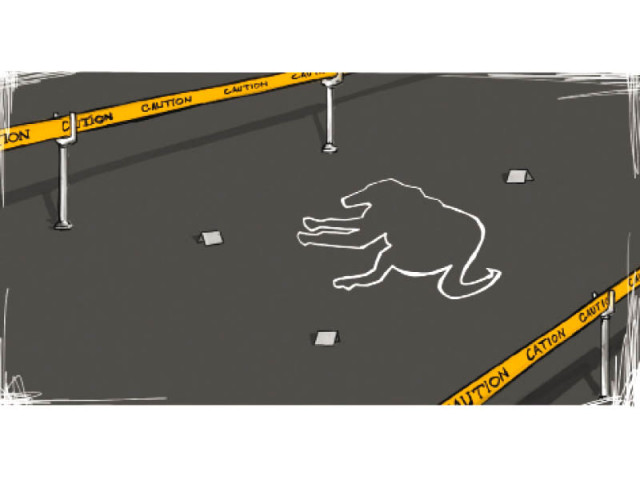Canine casualties: For city admin, citizens’ failings, stray dogs pay with lives
CDA shoots 106 stray dogs in two days; vet asks public to put collars on pets.

CDA shoots 106 stray dogs in two days; lawyer offers to set up animal shelter; vet asks public to put collars on pets.
ILLUSTRATION: JAMAL KHURSHID
In some parts of the world, dogs are considered man’s best friend. In Islamabad, the city managers consider them nothing more than moving targets.
Zeeshan Munir decided to write to the chairman of the capital’s civic agency against the brutal killing of stray dogs after a two-day shooting spree carried out by the Capital Development Authority (CDA).
The 28-year-old said he would offer to establish a sanctuary for stray dogs, provided the CDA could earmark a piece of land in the capital or its suburbs. “I can run the shelter at my cost,” Munir said.
A lawyer by profession, Munir also runs a small business in Islamabad. “I own four dogs of different breeds,” he added. Theinhumane shooting of 106 stray dogs by two CDA teams for two consecutive days, Thursday and Friday, persuaded Munir to raise a voice for them.

“It’s not acceptable to kill an animal in such a brutal way. It does not happen in civilised societies,” said an emotional Munir.
Reflecting the motive behind his idea to establish a home for stray dogs, He stated that instead of launching inhumane drives for shooting dogs, CDA should opt for a neutering campaign to control the population of abandoned dogs. A press statement issued by the authority says, “On the direction of CDA Chairman Nadeem Hassan Asif, the sanitation directorate killed 106 stray dogs.”

The sanitation directorate has constituted two teams, each comprising three dog shooters. During the past two days, the teams have shot 106 stray dogs in sectors G-6, G-7, G-8, F-6, E-11, Blue Area, model towns,Police Lines, Bari Imam and around Faisal Mosque.
Salman Ahmad, a volunteer at Bahria Animal Rescue Foundation Islamabad and Rawalpindi (BARF-IR), while speaking to The Express Tribune, deplored the incident, saying only rabid dogs were killed by shooting.

“If it’s necessary to put down a sick animal, an injection with a heavy dose of anaesthesia is used. It makes the killing less painful, but it is only for sick or incurable animals, not for healthy ones.”
He said shooting stray dogs and cats is widely practised by the municipalities of poor countries, where no arrangements exist to take care of abandoned animals. “But it’s globally treated as a violation of animal rights.”
BARF-IR is a non-profit organisation formed to help animals, which are in poor health or otherwise neglected. Rescued animals are put up for adoption.
The CDA sanitation directorate has launched several street dogs’ elimination campaigns. An official of the sanitation directorate said, “In Rawalpindi the municipality eliminates dogs in the capital by poisoning or shooting them.” Building a shelter for dogs or carrying out neutering campaigns would be a costly and time-consuming exercise and requires funds, while a bullet costs only Rs22, he added.
A CDA spokesperson said the drive was initiated following residents’ complaints about the abundance of stray dogs in their vicinity. The majority of complaints received were from model villages, especially Rawal Town, he added. “The drive will continue till a significant number of dogs are eliminated.”
Meanwhile, veterinarian Dr Faisal Khan, who runs Pets and Vets in Islamabad, admitted that keeping stray dogs at shelters is very costly, but opposed the CDA’s move to shoot strays on sight. He also pointed out a major flaw in the poisoning policy. “In the past, the CDA used to poison stray dogs, but it also impacted house pets which sometimes left the house and ate the poisoned food.”
Dr Khan also questioned how the CDA can distinguish between a stray and a domestic dog, as domestic dogs missing collars or tags are also killed in such drives. He said it is the responsibility of residents to register their dogs and put collars around their necks.
Published in The Express Tribune, September 22nd, 2013.



















COMMENTS
Comments are moderated and generally will be posted if they are on-topic and not abusive.
For more information, please see our Comments FAQ